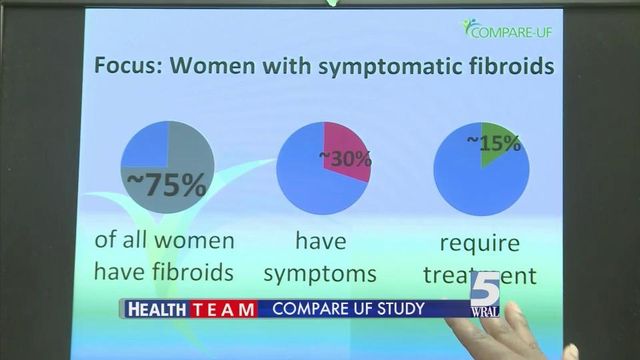New UNC study seeks best fibroid treatment for ailing women
A new five-year study is aimed at finding the best way to help each patient battling non-cancerous uterine fibroid tumors.
Posted — UpdatedWomen often face different health issues that men don't.
One that can really hurt a woman's quality of life are non-cancerous uterine fibroid tumors.
A new five-year study at the University of North Carolina at Chapel Hill is aimed at finding the best way to help each patient in a way that best suits their life goals.
Life was going along smoothly for Laura Maddux until she turned 31. That's when uterine fibroids caused excessive bleeding, anemia and fatigue.
"I needed blood transfusions, and I pretty much became a hermit," said Laura Maddux.
Uterine fibroids are typically round, hard tissue in the lining of the uterus and can appear as early as a woman's mid 20s or into her mid-50s.
About 75 percent of women have them but only about 30 percent experience symptoms. About 15 percent require treatment.
African-American women are about three times more likely to experience complications.
"Most women are counseled to try medical management first, maybe a pill or a shot to help control their symptoms," said Dr. Janelle Molder, a gynecology surgeon UNC Hospitals.
Some women, though, require more invasive procedures to remove the fibroids.
"Fibroids can be located in multiple parts of the uterus," said UNC gynecology surgeon Dr. Lauren Schiff. "The location of the fibroids really determines what the best surgical approach would be."
Compare UF follows patients over a five-year period and focuses on finding the best way to counsel women so they can achieve the best quality-of-life outcomes.
"We know really well how to treat uterine fibroids," Nicholson said. "I think what we don't know is what's the best treatment for different types of patients that we see."
Nicholson says older patients may choose a hysterectomy to resolve the problems while younger women may be more concerned about preserving their ability to have children.
Maddux first tried an outpatient procedure with laser ablation of her fibroids, but it only helped for a while.
After three years of suffering, she had open surgery to remove the fibroids.
"My quality of life has just gone back to what it used to be," Maddux said. "I do wish I had done it sooner."
UNC is the only study site in the state, and women already scheduled for uterine fibroid treatment there can enroll. Other women can speak with their physician about a referral. Anyone wanting more information should email compare-uf@unc.edu.
UNC also has several affiliate facilities in the Research Triangle Park area, including Rex Hospital and hospitals in Hillsborough and Clayton. They want to enroll as many women as they can in the study so the results will best reflect the needs of women.
The goal is to find out how to balance the most effective treatment with the best quality-of-life outcomes.
• Credits
Copyright 2024 by Capitol Broadcasting Company. All rights reserved. This material may not be published, broadcast, rewritten or redistributed.





